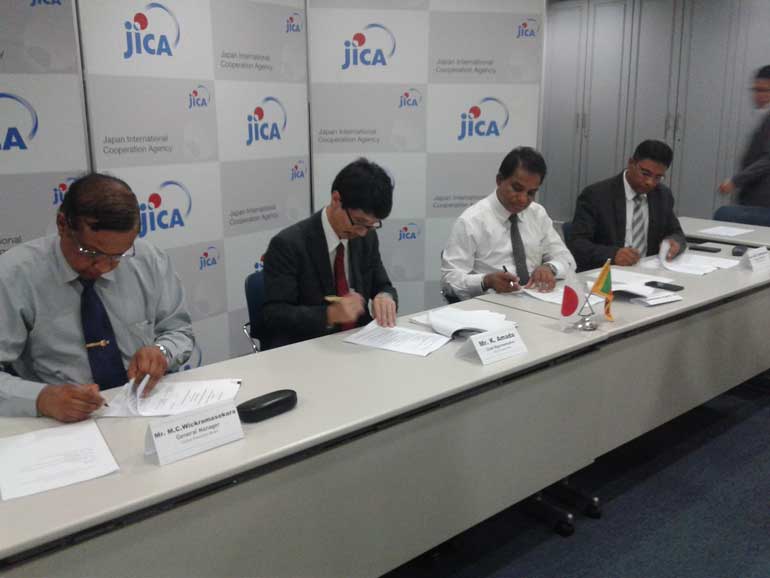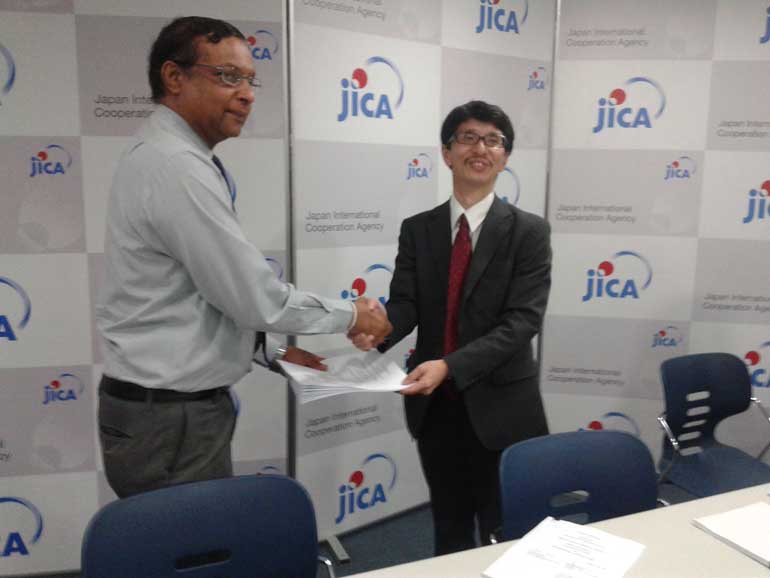Tuesday Feb 17, 2026
Tuesday Feb 17, 2026
Monday, 4 April 2016 00:00 - - {{hitsCtrl.values.hits}}

 A signing ceremony was held 1st April on the Record of Discussion for Technical Cooperation Project titled “The Project on Electricity Sector Master Plan Study” at the JICA Sri Lanka Office. The Record of Discussion was signed by the Secretary of Ministry of Power and Renewable Energy Dr. B.M.S Batagoda, Director General of Department of External Resources R.M.P. Rathnayake, the Ministry of National Policies and Economic Affairs, the General Manager of Ceylon Electricity Board M C Wickramasekara, and the Chief Representative of the JICA Sri Lanka Office Kiyoshi Amada.
A signing ceremony was held 1st April on the Record of Discussion for Technical Cooperation Project titled “The Project on Electricity Sector Master Plan Study” at the JICA Sri Lanka Office. The Record of Discussion was signed by the Secretary of Ministry of Power and Renewable Energy Dr. B.M.S Batagoda, Director General of Department of External Resources R.M.P. Rathnayake, the Ministry of National Policies and Economic Affairs, the General Manager of Ceylon Electricity Board M C Wickramasekara, and the Chief Representative of the JICA Sri Lanka Office Kiyoshi Amada.
The Ceylon Electricity Board (CEB), which is responsible to develop, operate and maintain a stable, efficient and economical electricity supply system, has prepared mid-to-long term investment plans. These plans which identify future investment projects, such as power generations, transmission lines, substations and distribution network to meet the future demand projections are formulated based on the Master Plan which covers 25 years and includes elaborate electricity demand modeling and power system analysis. Any master plan needs to be reviewed and updated at least in every 10 years to meet such requirements. In this project, the latest master plan which was also formulated through the support by JICA in year 2006 will be updated by considering development in the country and the latest technologies available in the field of power system for the next 25 years.
The expected goal of the project is to develop a comprehensive master plan of 25 years for the generation, transmission and distribution development for the whole country. The project will cover the consideration of new technical challenges which CEB as an implementing organisation may face by 2040, such as expansion of non-conventional renewable energy sources, private sector participation, pumped storage power plants, optimal operation of coal thermal power plants, railway electrification and utilisation of local gas and LNG. In addition, the project will also include developing optimal financial strategy which will be formulated through reviewing and analysing of financial figures such as present tariff levels, cost structures and borrowing capacity of the CEB.
The project will be implemented through Joint Study Team which will be organised by CEB experts and JICA experts. Since the project will tackle high level technical challenges the mature cooperation between CEB experts and JICA experts who have deep expertise and experience will be a key to success of the project.
JICA has been cooperating with CEB for a long time in terms of not only technical cooperation but also ODA loans. It is expected to achieve stable, economical and environmentally friendly electricity supply in Sri Lanka through the cooperation between CEB and JICA.